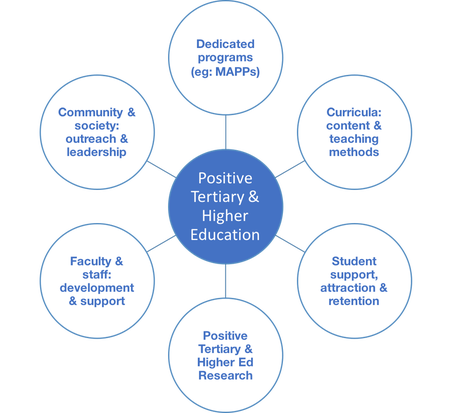Why a Wellbeing in Higher Education Network?
“The connection between higher education and positive psychology is a natural one, as both are concerned with the formation of healthy, productive, and thriving human beings” (Mather & Hulme, 2013, p. 1)
“The connection between higher education and positive psychology is a natural one, as both are concerned with the formation of healthy, productive, and thriving human beings” (Mather & Hulme, 2013, p. 1)
Organisations such as the International Positive Education Network (I-PEN) are helping organise and connect researchers, educators and practitioners in the application of positive psychology in education. However, to date the focus and practice of positive education has mainly aimed at primary (elementary) and secondary school education.
Positive psychology theory and practice is being embedded in higher and tertiary education, but it remains ad hoc. The aim of the Wellbeing in Higher Education Network is to share examples and build knowledge; connect people working to develop and embed positive education in the higher and tertiary education sectors; and provide opportunities for exchange and collaboration.
Positive psychology theory and practice is being embedded in higher and tertiary education, but it remains ad hoc. The aim of the Wellbeing in Higher Education Network is to share examples and build knowledge; connect people working to develop and embed positive education in the higher and tertiary education sectors; and provide opportunities for exchange and collaboration.
What is Positive Education?
Positive Education is the application of positive psychology to education. It combines a focus on strengths, wellbeing and character in teaching and learning environments.
What is Wellbeing in Higher Education?
Tertiary and higher education is a broad category that covers adult education in the post-compulsory (school) education sector. It includes:
- universities (undergraduate and postgraduate)
- vocational and continuing education and training (e.g., polytechnics, TAFEs, community colleges)
- professional education and training
- courses and programs aimed at youth and adults provided by practitioners, individuals, companies, non-profits and institutions
Areas of Wellbeing
Areas of wellbeing practice in higher education include:
- Dedicated qualifications and courses in positive psychology
e.g., MAPPs (Masters of Applied Positive Psychology), undergraduate programs and subjects, and certificates. - Faculty and staff
Positive psychology initiatives, services and practices to support staff and faculty in tertiary and higher education. - Positive psychology applied in curriculum
Curricular applications such as the integration of positive psychology content in courses, and positive psychology principles and practices applied to teaching methods. - Research
Research in positive psychology and positive education in the tertiary and higher education sector. - Extra and co-curricula
Positive psychology initiatives, services and practices to support learning and student attraction, retention, and success, campus culture and environment. - Community and society
Outreach and leadership in the application of positive psychology for individuals and society. For example, public outreach, consulting, program delivery, policy development.

